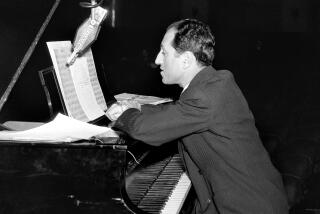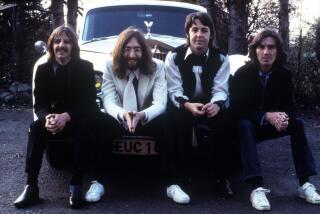O, say can you write an anthem?
In a game of word association, Abbey Road equals the Beatles and nothing else. But the Fab Four are but one part of this illustrious studio’s history. For the first 20 years of its life, Abbey Road Studios was home to classical music recordings made by EMI. The first recording at the studio was “Land of Hope and Glory” conducted by Edward Elgar in 1931.
To mark its 80th birthday, Abbey Road has a devised a competition that gives composers of all ages and abilities the opportunity to have a piece recorded at the studio with the London Symphony Orchestra and some of the U.K.’s best singers.
The challenge? Compose an anthem scored for choir that has not been previously published or commercially recorded.
In its most narrow definition, an anthem is a piece of laudatory or celebratory religious music sung by a choir.
Considering the activities with which traditional non-national anthems are most closely associated — soccer, rugby and cricket matches, mainstream church services and coronations — it is quite possible to go a lifetime without hearing one.
The 21st century definition of anthem has expanded to include essentially any song to which a crowd of people would spontaneously sing along. (“YMCA,” “Dancing Queen,” “We Will Rock You,” etc.) Of course, if you’re a record-label marketer, there are no guidelines. For instance, “25 Greatest BBQ Anthems” (“Don’t Stop Believing,” “More Than Feeling)” is no less legit as a compilation that might feature chestnuts by Elgar, Charles Villiers Stanford, Vaughan Williams and Hubert Parry — and, let’s be honest, would sell more copies.
The birthplace of the anthem is the Anglican church. At the royal wedding in April, the piece to which the bride, Catherine, and her father, Michael, walked down the aisle was “I Was Glad” by Parry, one of the most well-loved of the genre. Heard later during the service was a new anthem, “Ubi caritas,” by Welsh composer Paul Mealor.
In modern Britain, however, the most common place to hear an anthem is at a sporting match. During the game, the piece serves as a tribal indicator. The Welsh national rugby team has adopted the hymn “Guide Me Oh Thou Great Redeemer,” English cricket “Jerusalem,” and the Shaker song “Simple Gifts” has been repurposed for use by Manchester United soccer team. The Scottish National soccer team, rather curiously (or not, given the amount of alcohol regularly consumed by many sports fans) has adopted “Do-Re-Mi” from “The Sound of Music.”
Hearing thousands of drunken men shout-sing at the stadium does have a certain appeal but in a genre almost infinite in its scope, there are many alternative styles.
Anthems can by polyphonic (Byrd — “Dilectus meus”), homophonic (Mozart — “Ave verum corpus”), lyrical (Mendelssohn — “I Waited for the Lord”), powerful (Stainer — “I Saw The Lord”), have a solo (Mozart — “Laudate Dominum”) or not. Any period of music from Renaissance to contemporary is fair game. The style is less important than the length (shorter than six minutes) and language (English).
While all the above examples are sacred, the new anthem doesn’t have to be. Abbey Road requires only that the piece be celebratory, reinforcing a group’s identity or in praise of something.
You can even enter if you’re not an experienced orchestrator. All you have to do is write the choir parts and Abbey Road will make sure the London Symphony Orchestra doesn’t sit idle should your work be chosen.
After the contest closes on July 15, up to 10 anthems will be chosen by judges Eric Whitacre and Harry Christophers, conductor of the Sixteen, film composer George Fenton and arranger Rob Mathes.
For details on the rules and how to enter, visit https://www.abbeyroad.com/anthem.
Short on inspiration? Head over to the Culture Monster blog to hear our top 10 anthems.
More to Read
The biggest entertainment stories
Get our big stories about Hollywood, film, television, music, arts, culture and more right in your inbox as soon as they publish.
You may occasionally receive promotional content from the Los Angeles Times.






